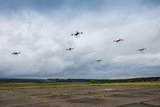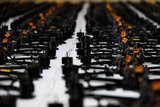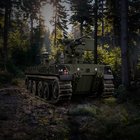The heat is on for international robot race
Four Australian and eight overseas technology teams are gearing up this month for the elimination round in the international challenge to find the next generation of fully autonomous robots that can carry out defence missions in the battlefield of the future.
The grand challenge event will be held in South Australia in November this year, with close to US $2 million up for grabs in total prize money for the competing Multi-Autonomous Ground-robotics International Challenge (MAGIC) teams.
Greg Combet, Minister for Defence Materiel and Science, said a panel of Australian and US Defence scientists will evaluate the robot prototypes developed by the 12 shortlisted teams in Australia, USA, Canada, Turkey and Japan for MAGIC.
The 12 teams were narrowed down from 23 entries originally received for the competition.
"The MAGIC Technical Assessment Panel will visit each of the 12 teams over the next few weeks for an intensive evaluation of their concept demonstrators which will result in a list of five finalists," Mr Combet said.
"The final teams will be announced in July, giving the selected teams four months to refine and continue development of their concepts."
"Each of the finalists will receive further research grants of US $50,000 to complete their projects for the Grand Challenge," Mr Combet said.
The MAGIC initiative is jointly organised by Australia's Defence Science & Technology Organisation and the US Department of Defense.
"MAGIC aims to develop fully autonomous robots capable of conducting dangerous missions and keeping soldiers out of harm's way," Mr Combet said.
The four Australian teams include the University of New South Wales; MAGICIAN (a collaboration between the University of Western Australia, Flinders University, Edith Cowan University, Thales Australia and ILLIARC Pty Ltd); Sydney company Strategic Engineering in association with the University of Adelaide; and Melbourne company Numinance in association with La Trobe University.
The international teams include Northern Hunters (Canada), Chiba University (Japan), Cappadocia (Turkey), Reconnaissance and Autonomy for Small Robots Team (USA), Cornell University (USA), University of Michigan, Team VACAS (Virginia Tech, USA) and the University of Pennsylvania (USA).
Source: DMO
More from Uncrewed Vehicles
-
![US Navy foresees an uncrewed future for its surface and underwater fleet]()
US Navy foresees an uncrewed future for its surface and underwater fleet
The service has been conducting various procurement and development efforts to integrate unmanned surface and underwater vehicles into its inventory.
-
![Tekever unveils new swarm-controlling UAS]()
Tekever unveils new swarm-controlling UAS
Tekever has manufactured the AR3, AR4 and AR5 UAS with all systems sharing common electronics and software architecture, which has enabled the reuse of ground segment elements within the new ARX UAS.
-
![Ready for the race: Air separation drone swarms vs. air defence systems]()
Ready for the race: Air separation drone swarms vs. air defence systems
As the dynamics of aerial combat rapidly evolve, Chinese scientists have engineered a sophisticated air separation drone model that can fragment into up to six drones, each capable of executing distinct battlefield roles and challenging the efficacy of current anti-drone defences such as the UK’s Dragonfire laser system.
-
![Israel’s MALE UAVs ‘must adapt’ to Iranian-made air defences]()
Israel’s MALE UAVs ‘must adapt’ to Iranian-made air defences
Advancements in air defence technologies have begun to reshape aerial combat dynamics in the Middle East, as illustrated by recent events involving the Israeli Air Force and Hezbollah.
-
![Hundreds more UAS sent to Ukraine forces with thousands more on the way]()
Hundreds more UAS sent to Ukraine forces with thousands more on the way
Both sides of the Russia-Ukraine war have been using UAS for effective low-cost attacks, as well as impactful web and social media footage. Thousands more have now been committed to Ukrainian forces.
-
![AI and software companies selected for US Army Robotic Combat Vehicle subsystems]()
AI and software companies selected for US Army Robotic Combat Vehicle subsystems
The US Army has intentions to develop light, medium and heavy variants of the Robotic Combat Vehicle (RCV) as part of the branche’s Next Generation Combat Vehicle family.
























